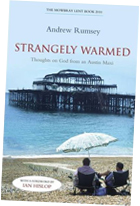| |
|
|
| Unoriginal sin |
 |
March 2001
Musing for Lent on the meaningless and unending pain of existence, my thoughts naturally return to schooldays, and especially the perverse talent we boys displayed for inflicting Job-like torments upon one another.
Whether this was acquired behaviour or simply the inherited wisdom of former generations it is hard to judge; but certainly the names of these infernal practices – the Chinese burn; the dead arm; the nipple screw – imply a murky provenance somewhere around the reign of King Arthur. Long before the horrible bloodlust of Hannibal or Reservoir Dogs, pimply youths were "getting medieval" on each other to pass the time during double geography.
Often this torture took the form of a dull game called "pass it on". The stratagem – not the fruit of a fertile or subtle mind – was essentially utilitarian: one child would choose a treatment from the aforementioned palette of options and inflict it upon his neighbour, accompanied by the weasel words "pass it on".
By turning his assault into a game, he thus excused himself from any retribution and ensured that his chosen attack would spread from desk to desk like a virus. The general effect was that of a moderately painful and extremely irritating Mexican Wave. Anybody could have stopped it and either not passed it on or passed it back (with interest), but of course no one ever did. We all just went along with it. We passed it on.
The wearying, cyclical nature of such things – which the writer of Ecclesiastes expounds to such effect – holds true in myriad ways beyond the school gates, from the relentless bullying of Nike-alike consumerism to the various forms of abuse and addiction that domino down the generations. Sin is, and ever has been, contagious, habit-forming; inescapable.
At its most basic level, sin is therefore profoundly unoriginal – it thrives by implication and association, on each being and doing exactly the same as everyone else. The virtuous are the true originals: those who, like Dietrich Bonhoeffer during World War II, refuse to pass on the infection, who seem not have read the rules. Like Bonhoeffer, too, they are usually those who end up getting killed.
In one of its occasional flashes of brilliance and biblical insight, the historic church of Christ opted early on to confront the predictable pattern and build into its year an alternative rhythm, so that the calendar itself might be prophetic. With the playful sense of drama and variety that resurfaces now and again in every Christian's sock drawer, they devised a new game, with its own novel rules and ingenious festivals, based on the remembrance of God's saving acts.
Lent, whose drab colours and self-denial might appear at first glance to be the Old Kent Road of the church's Monopoly board, in practise proves to be its Mayfair. It remains a wonderful spanner in the works of the world – a time for squaring up to sin's sad circus.
Interestingly, it also yields some of the finest and most authentically Christian literature. Whilst the marketing flurry surrounding this increasingly popular genre is somewhat at odds with the ascetic mood of the season, Lent books are, without fail, the best of the year.
For my book token, David Ford's The Shape of Living (Fount) and Michael Mayne's Pray, Love, Remember (DLT) are the most outstanding of recent years, while this Lent sees inviting new titles from, among others, Rowan Williams and Mark Oakley, plus a welcome collection of Dietrich Bonhoeffer's Meditations on the Cross (WJK). This slender masterpiece, culled from the great man's sermons, letters and lectures perhaps comes closest to the heart of Lent's long walk to the cross.
Reading Bonhoeffer is a little like a trip to the dentist – a painful, but necessary treatment that most of us keep meaning to get around to. When I eventually read The Cost of Discipleship some years ago, it induced in me the same hot panic and protest and I remain indebted to the sturdy friends who were on hand throughout to restrain me in my chair. You see, he will keep insisting that Christianity is a hard road; that its genius lies, as Dennis Potter puts it, in the "the wound, not the bandage".
This conviction, which brought about the Confessing Church's opposition to Hitler and ultimately Bonhoeffer's own execution in 1944, makes his words deeply unsettling for a Body of Christ sitting rather too comfortably. He, like Lent, sets us among the soldiers dicing and baiting beneath the cross – and asks for faith when our turn comes. |
|
|
 |
 |
 |
| Strangely Warmed by Andrew Rumsey is now available as a book. |
 |
 |
 |
 |
 |
| Stephen Tomkins' regular column of tales of religious lunacy from the far reaches of the Net |
 |
 |
 |
| Mark Howe's regular rant about Internet culture |
 |
 |
 |
| Also by Stephen Tomkins... a regular round-up of the saints of yore who were one wafer short of a full communion |
| |
|
|
|
|


